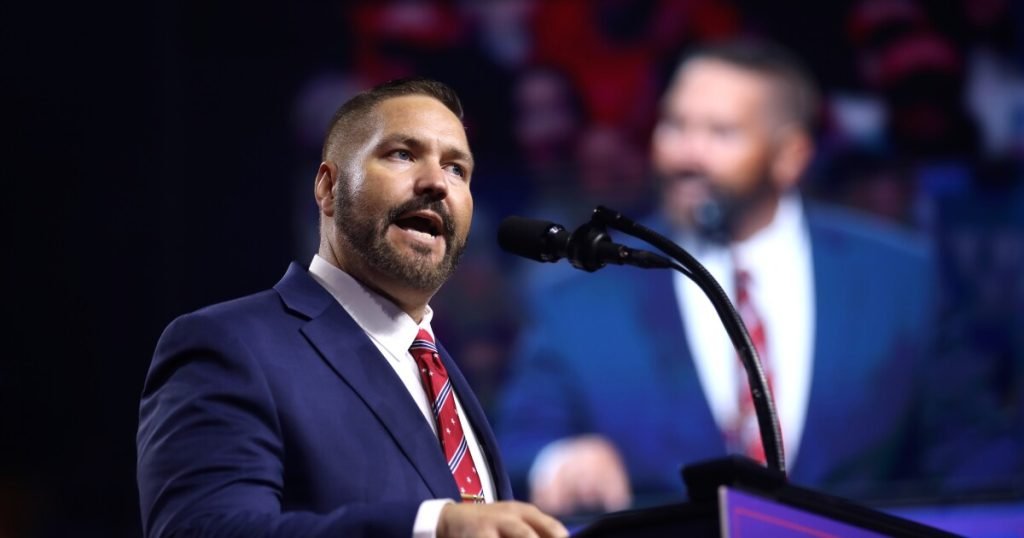The Republican candidate for Maricopa County Recorder was fired just months after being hired by the county public defender's office in 2010.
The public defender's office hired Justin Heap, now a state representative, in August 2010, less than a year after he was admitted to the Arizona State Bar in December 2009, according to county employment records. did.
Less than three months later, the office terminated his employment, according to a Nov. 2, 2010, letter signed by James Haas, who was heading the county's public defender's office at the time.
“This release is due to an unsatisfactory completion of the initial probationary period,” the letter said.
The reason for the dismissal remains unclear.
Mr. Haas, who retired in 2020, said he did not remember Mr. Heap, noting that Mr. Heap's tenure was relatively brief at the 400-plus-employee office more than a decade ago. .
But Haas said it is rare for new employees to be fired before their probationary period ends.
Heap was one of two employees fired in 2010 for failing to complete a probationary period, according to Maricopa County Public Defender's Office records obtained under the Arizona Public Records Act.
Heap declined to say why he was fired, insisting in a written statement that he had not been fired.
“I have been blessed with a successful legal career defending the individual liberties and rights of Arizonans,” Heap said. “The claim that I was fired from the public defender's office is 100% false.”
In a conversation with the public defender's office, Heap said, “Those who were hired before 2018 were hired on a probationary period, and the documents in question cover all probationary periods who did not remain on probation.” “It was clarified that it was a “standard document'' given to employees inside the company.'' After the trial period ends, you will be promoted to a full-time employee. ”
But Haas, a former public defender who ran the office for decades, offered a different explanation.
He confirmed Heap's explanation that in the past all new employees were hired on a probationary period. This meant that they could be dismissed 'without cause', meaning they had no right to appeal their dismissal.
But Haas said that doesn't mean the firm doesn't have a reason to fire employees like Heap for “unsatisfactory completion” of a probationary period.
“That's not to say there wasn't a cause. I can almost guarantee there was a cause,” Haas said. “It doesn’t make sense for a firm to hire someone, invest in their training, and then immediately fire them.”
The cause can cover a variety of issues for lawyers. In one case, Haas recalls, a new employee was fired because he didn't take the required training.
Mr. Haas reiterated that he did not remember the specific circumstances of Mr. Heap's case.
“The bottom line is something went wrong,” he said.
Heap is still practicing law in Arizona and has a clean record with no complaints filed in Arizona courts.
Heap owns his own law firm in Mesa, which he first incorporated in February 2010, several months before he was hired as a public defender, according to state financial disclosures and business records. When he first ran for Congress in 2022, Heap listed his business location in Show Low, about 250 miles from the Mesa district he was later elected to represent.
An affidavit Heap signed in August 2009, the year before he started working at the public defender's office, says he volunteered as a prosecutor in the Maricopa County Attorney's Office under embattled former county attorney Andrew Thomas. The Arizona State Capitol Times reported.
But again, it's unclear what role Mr. Heap played under the county attorney's office. The Capitol Times reported that former deputy county attorney Phil McDonnell could not remember what kind of work Heap did.
The uncertainty over Mr. Heap's professional background comes as a candidate hoping to take over the position responsible for voter registration, early voting, title tracking, liens and other important documents in the nation's fourth-largest county. This is the latest question surrounding the issue.
Heap has faced criticism before; The Secretary of State's Office found reasonable cause to believe he violated campaign finance laws. For failing to report five contributions to legislative campaigns from political action committees totaling approximately $2,500. A spokeswoman for the attorney general's office said an investigation into these allegations is ongoing.
















